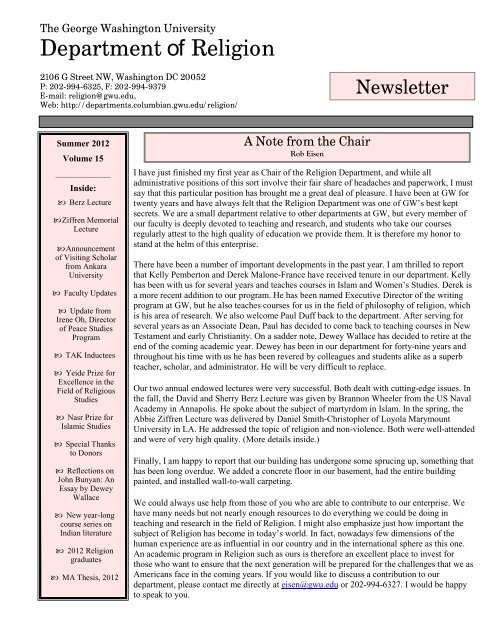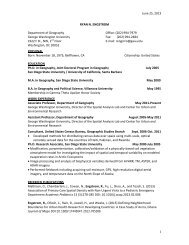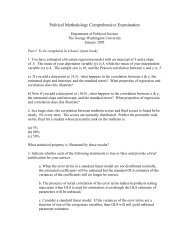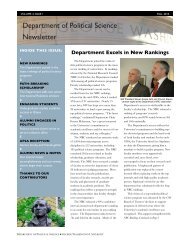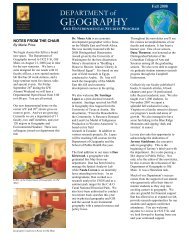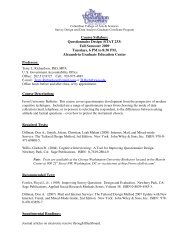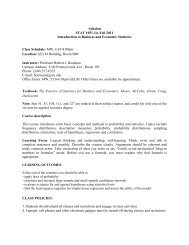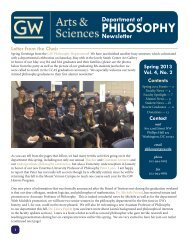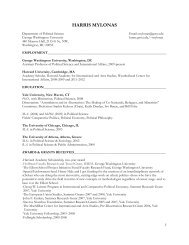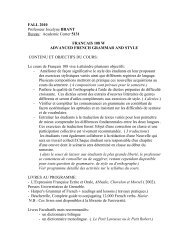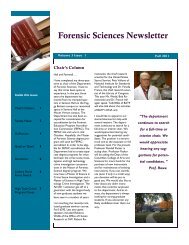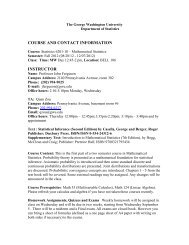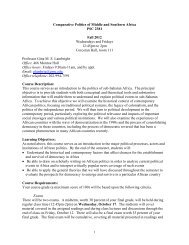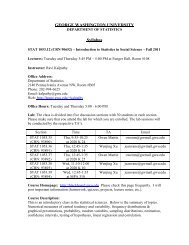Religion - Departments & Programs - George Washington University
Religion - Departments & Programs - George Washington University
Religion - Departments & Programs - George Washington University
Create successful ePaper yourself
Turn your PDF publications into a flip-book with our unique Google optimized e-Paper software.
The <strong>George</strong> <strong>Washington</strong> <strong>University</strong><br />
Department of <strong>Religion</strong><br />
2106 G Street NW, <strong>Washington</strong> DC 20052<br />
P: 202-994-6325, F: 202-994-9379<br />
E-mail: religion@gwu.edu,<br />
Web: http://departments.columbian.gwu.edu/religion/<br />
Newsletter<br />
Summer 2012<br />
Volume 15<br />
_________________<br />
Inside:<br />
Berz Lecture<br />
Ziffren Memorial<br />
Lecture<br />
Announcement<br />
of Visiting Scholar<br />
from Ankara<br />
<strong>University</strong><br />
Faculty Updates<br />
Update from<br />
Irene Oh, Director<br />
of Peace Studies<br />
Program<br />
TAK Inductees<br />
Yeide Prize for<br />
Excellence in the<br />
Field of Religious<br />
Studies<br />
Nasr Prize for<br />
Islamic Studies<br />
Special Thanks<br />
to Donors<br />
Reflections on<br />
John Bunyan: An<br />
Essay by Dewey<br />
Wallace<br />
New year-long<br />
course series on<br />
Indian literature<br />
2012 <strong>Religion</strong><br />
graduates<br />
MA Thesis, 2012<br />
A Note from the Chair<br />
Rob Eisen<br />
I have just finished my first year as Chair of the <strong>Religion</strong> Department, and while all<br />
administrative positions of this sort involve their fair share of headaches and paperwork, I must<br />
say that this particular position has brought me a great deal of pleasure. I have been at GW for<br />
twenty years and have always felt that the <strong>Religion</strong> Department was one of GW’s best kept<br />
secrets. We are a small department relative to other departments at GW, but every member of<br />
our faculty is deeply devoted to teaching and research, and students who take our courses<br />
regularly attest to the high quality of education we provide them. It is therefore my honor to<br />
stand at the helm of this enterprise.<br />
There have been a number of important developments in the past year. I am thrilled to report<br />
that Kelly Pemberton and Derek Malone-France have received tenure in our department. Kelly<br />
has been with us for several years and teaches courses in Islam and Women’s Studies. Derek is<br />
a more recent addition to our program. He has been named Executive Director of the writing<br />
program at GW, but he also teaches courses for us in the field of philosophy of religion, which<br />
is his area of research. We also welcome Paul Duff back to the department. After serving for<br />
several years as an Associate Dean, Paul has decided to come back to teaching courses in New<br />
Testament and early Christianity. On a sadder note, Dewey Wallace has decided to retire at the<br />
end of the coming academic year. Dewey has been in our department for forty-nine years and<br />
throughout his time with us he has been revered by colleagues and students alike as a superb<br />
teacher, scholar, and administrator. He will be very difficult to replace.<br />
Our two annual endowed lectures were very successful. Both dealt with cutting-edge issues. In<br />
the fall, the David and Sherry Berz Lecture was given by Brannon Wheeler from the US Naval<br />
Academy in Annapolis. He spoke about the subject of martyrdom in Islam. In the spring, the<br />
Abbie Ziffren Lecture was delivered by Daniel Smith-Christopher of Loyola Marymount<br />
<strong>University</strong> in LA. He addressed the topic of religion and non-violence. Both were well-attended<br />
and were of very high quality. (More details inside.)<br />
Finally, I am happy to report that our building has undergone some sprucing up, something that<br />
has been long overdue. We added a concrete floor in our basement, had the entire building<br />
painted, and installed wall-to-wall carpeting.<br />
We could always use help from those of you who are able to contribute to our enterprise. We<br />
have many needs but not nearly enough resources to do everything we could be doing in<br />
teaching and research in the field of <strong>Religion</strong>. I might also emphasize just how important the<br />
subject of <strong>Religion</strong> has become in today’s world. In fact, nowadays few dimensions of the<br />
human experience are as influential in our country and in the international sphere as this one.<br />
An academic program in <strong>Religion</strong> such as ours is therefore an excellent place to invest for<br />
those who want to ensure that the next generation will be prepared for the challenges that we as<br />
Americans face in the coming years. If you would like to discuss a contribution to our<br />
department, please contact me directly at eisen@gwu.edu or 202-994-6327. I would be happy<br />
to speak to you.
GW <strong>Religion</strong> Department Newsletter Summer 2012<br />
David and Sherry Berz Lecture, Fall 2011<br />
In November, Professor of History Brannon Wheeler, Founder and Director of the Center for Middle East<br />
and Islamic Studies at the United States Naval Academy, delivered the Annual Berz lecture. His talk,<br />
“Martyrdom and Cosmogonic Sacrifice in Islam,” analyzed the aforementioned themes in historical<br />
perspective, beginning with the model of sacrifice exemplified in the Prophet Muhammad’s farewell<br />
pilgrimage to Mecca in 632. The Prophet’s sacrifice of a camel, as well as his distribution of shorn hair<br />
during this event, served as a seminal moment in Islamic history that, according to Wheeler, linked the<br />
practice of Islam with the Abrahamic example of sacrifice. It also served as a model for Muslim practices<br />
and concepts of self-sacrifice (including, controversially, suicide bombing) in subsequent generations.<br />
More broadly, Wheeler drew connections between this sacrifice and myths from other Near Eastern<br />
contexts, such as that of the Mesopotamian Enuma Elish. This sacrifice of body parts, according to<br />
Wheeler, illustrates the connection between body, cosmogony, and the establishment of new social orders.<br />
Professor Wheeler is an accomplished scholar who has written extensively on prophet-hood in Judaism<br />
and Islam, relics, and Islamic law. He is also editor of the journal Comparative Islamic Studies and author<br />
of many articles and books, including Mecca and Eden: Ritual Relics, and Territory in Islam (<strong>University</strong><br />
of Chicago Press, 2006).<br />
The David and Sherry Berz Endowed Lecture is made possible by a gift from David Berz, BA '70, JD '73<br />
<br />
2
GW <strong>Religion</strong> Department Newsletter Summer 2012<br />
Abbie Ziffren Memorial Lecture, Spring 2012<br />
In March, the annual Abbie Ziffren Lecture was delivered by Daniel Smith-Christopher, Professor of<br />
Religious Studies at Loyola Marymount in Los Angeles. Smith-Christopher is a scholar of great versatility.<br />
He is a specialist in the Bible, with a focus on the Old Testament, and is also an expert on non-violence and<br />
pacifism. Among his many other interests, Smith-Christopher has also developed an expertise on the role of<br />
Scripture in African-American Gospel and the musical and lyrical traditions of Blues.<br />
It was in his capacity as a scholar of non-violence and pacifism that we invited Smith-Christopher to<br />
deliver the Ziffren Lecture. This lecture celebrates the life of Abbie Ziffren, who taught in the <strong>Religion</strong><br />
Department in the late 1980’s and early 1990’s before her untimely passing, and each year we attempt to<br />
preserve Abbie’s memory by inviting a lecturer who will address our faculty and students about an area in<br />
which Abbie was interested. Non-violence was one of those areas and Smith-Christopher was asked to<br />
address this topic.<br />
Smith-Christopher spoke on the subject of “Political Atheism and Radical Faith: The Challenge of<br />
Religious Nonviolence,” in which he mapped out justifications for non-violence and pacifism in dealing with<br />
war and international conflict. The talk combined high-level academic insights with personal perspectives.<br />
Smith-Christopher affiliates with the Quaker denomination of Christianity, a denomination well-known for its<br />
pacifism, and he was very open about how that affiliation had informed his thinking.<br />
Smith-Christopher’s talk excited a great deal of discussion in the question-and-answer period. Many<br />
of the students who attended were familiar with the subject of pacifism because of coursework they had taken<br />
in the <strong>Religion</strong> Department and the Peace Studies Program at GW that touched on that topic. Pacifism, by its<br />
nature, tends to be controversial because it goes against the grain of the majority of public opinion in the US<br />
regarding war and international conflict, and some students therefore challenged Smith-Christopher’s<br />
positions. Yet, whether one agreed or disagreed with Smith-Christopher’s views, his presentation was<br />
appreciated by everyone for its depth and sophistication.<br />
<br />
Visiting Scholar 2012<br />
We are excited to welcome a visiting scholar, Serpil Sancar, to our department for 2012. Professor Sancar is<br />
visiting from Ankara <strong>University</strong> in Turkey and is here doing research for a book titled Shifting Perspectives in<br />
Islamic Politics: Different Aspects of Islamic Women’s New Public Visibility.<br />
We are looking forwarded to having Professor Sancar visiting with us for the rest 2012 and hope to have her<br />
share her research in a lecture in the Fall semester. Please look for a piece on her and her work in more detail<br />
in next year’s department newsletter!<br />
3
GW <strong>Religion</strong> Department Newsletter Summer 2012<br />
Faculty Updates<br />
Eyal Aviv taught a new course this past year about Buddhist ethics and was a finalist for the Bender teaching<br />
award. Professor Aviv published an article in the Journal of the Oxford Centre of Buddhist Studies titled "Ambitions and<br />
Negotiations: The Growing Role of Laity in 20th Century Chinese Buddhism" and is about to publish another paper titled<br />
“<strong>Religion</strong>, Historiography and Cultural Identity in the Debate over Xuyun’s Biography” in Modern China.<br />
Professor Aviv has also presented a paper in a conference that took place in Hawaii in December. The conference<br />
concluded an international three-year project, led by Australian National <strong>University</strong>. The project has produced a book<br />
(forthcoming) to which Professor Aviv contributed an article titled: “Ouyang Jingwu: From Yogācāra scholasticism to<br />
Soteriology.” Another international project that professor Aviv began this year is a comparative study of commentarial<br />
traditions between Tibetan and Chinese Buddhists. During the summer he is planning to divide his time between his book<br />
project and the study of Tibetan language.<br />
Paul Duff contributed a chapter entitled “Revelation” to The Oxford Encyclopedia of the Books of the Bible, vol. 2. (edited by<br />
Michael Coogan. Pp 256-71 Oxford: Oxford <strong>University</strong> Press, 2011) and also published an article titled “Paul’s Elusive<br />
Opponents: Reading 2 Corinthians 3 in a Non-Polemical Context,” in Volume 54 of the journal Biblical Research (pp 37-59).<br />
He also presented a paper titled “Israel’s Hardened Minds: 2 Cor 3:14a and the Development of a Theological Idea,” at the<br />
annual meeting of the Society of Biblical Literature in San Francisco in November.<br />
Rob Eisen’s recent book, The Peace and Violence of Judaism: From the Bible to Modern Zionism (Oxford <strong>University</strong> Press, 2011),<br />
has been receiving excellent reviews in popular and academic journals. His latest research has begun to focus on two new<br />
areas that are connected with this project: approaches to war in Jewish law and the role of religion in the Israeli-<br />
Palestinian conflict. He was invited in the spring to deliver a paper at <strong>George</strong>town <strong>University</strong> for a conference on religious<br />
pluralism that was entitled, “Reflections on the Noahide Laws as a Source for Religious Pluralism.” Professor Eisen has also<br />
remained active in peace-building and interfaith dialogue outside the university. He has been invited to serve on the<br />
Middle East Advisory Board for Search for Common Ground, the largest peace-building organization in the country.<br />
Alf Hiltebeitel published three books this past academic year: Dharma: Its Early History in Law, <strong>Religion</strong>, and Narrative. South Asia<br />
Research Series, Patrick Olivelle, ed. (New York: Oxford <strong>University</strong> Press, 2011); Reading the Fifth Veda: Studies on the<br />
Mahābhārata—Essays by Alf Hiltebeitel, vol.1.Vishva Adluri and Joydeep Bagchee, eds. Numen Book Series, Studies in the<br />
History of <strong>Religion</strong>s: Texts and Sources in the History of <strong>Religion</strong>s, Vol. 131. (Leiden: E. J. Brill, 2011); and When the Goddess Was<br />
a Woman: Mahābhārata Ethnographies—Essays by Alf Hiltebeitel, vol. 2. Vishva Adluri and Joydeep Bagchee, eds. Same series, Vol.<br />
132.). He also published four articles, including “Just My Imagination? Puzzling through a Duryodhana Festival near<br />
Dharmapuri, Tamilnadu.” In Hilary Rodriguez, ed. Hinduism in Practice. 87-103. London: Routledge, 2011 (a book for<br />
undergraduate students on how scholars in different fields approach fieldwork on religious practices in India); and “You<br />
Have to Read the Whole Thing’: Some Reflections on Madeleine Biardeau’ s Mahābhārata,”, from «Du texte au terrain, du terrain<br />
au texte: dialogues disciplinaires autour de l’œuvre de Madeleine Biardeau» Journée du Centre d’Étude de l’Inde et de l’Asie du Sud.<br />
Paris, April 5, 2011.<br />
In January 2012, Alf was one of three co-chairs, with Adam Bowles, <strong>University</strong> of Brisbane, and Simon Brodbeck, <strong>University</strong><br />
of Cardiff, of the “Epics and Purāṇās” section of the 15 th World Sansakrit Conferece in New Delhi. He also gave several<br />
conference presentations throughout the year, including the plenary keynote address at the 6 th Annual Meeting of the South<br />
4
GW <strong>Religion</strong> Department Newsletter Summer 2012<br />
Asian Studies Association, April 14, 2012, in Claremont CA. At the 6 th Annual Meeting of the South Asian Studies Association<br />
(SASA), he received the SASA-Exemplar Award for Academic Excellence and a Certificate of Academic Excellence from the<br />
Claremont Graduate <strong>University</strong>, Claremont <strong>University</strong>, Claremont, CA.<br />
Xiaofei Kang developed two new courses this year, “Women and <strong>Religion</strong> in China,” and “<strong>Religion</strong> in Modern China.” She<br />
began research and writing for a new project on women, gender and religion in the twentieth century Communist discourse<br />
of revolution. She presented some of the preliminary findings at the Conference on Women, Gender and Chinese <strong>Religion</strong>s<br />
in June 2011 at the <strong>University</strong> of Macau, and at the Fairbank Center of Harvard <strong>University</strong> in April 2012. In addition, she is<br />
co-editing the Macau conference volume for publication and is writing an article on women and religion in twentieth<br />
century China for a collaborative book project entitled the “Construction of Contemporary China.” In terms of service to<br />
the academic community, she serves on the AAR’s International Connection Committee and two steering committees. She<br />
also joined the GWU team to set up the Confucian Institute.<br />
Derek Malone-France transitioned from interim to permanent Executive Director of the <strong>University</strong> Writing Program at GW<br />
and received tenure in <strong>Religion</strong>. Derek published two books this year. His monograph, Faith, Fallibility, and the Virtue of<br />
Anxiety: An Essay in <strong>Religion</strong> and Political Liberalism was published by Palgrave MacMilan. And his two-volume edited<br />
anthology, Political Dissent--A Global Reader, Vol. 1: Ancient to Early-Modern Sources & Vol. 2: Modern Sources, was published by<br />
Lexington Books. Derek also gave an invited lecture at American <strong>University</strong> in January titled "Judging Abraham: Faith,<br />
Coercion, and Autonomy in the Public Sphere" and delivered a paper titled "<strong>Religion</strong>, Nationalism, and Democratic<br />
Citizenship" at the annual meeting of the Society for Philosophy of <strong>Religion</strong> in March. He also served as a Referee for the<br />
prestigious Kluge Prize at the Library of Congress.<br />
Seyyed Hossein Nasr spent most of his research time last year as editor-in-chief of the Study/Quran, to be published by<br />
Harper. The editors hope to have the work go to press in June of this Year. Also he has just finished proofreading vol. IV of<br />
the Anthology of Philosophy in Persia, which is planned to appear this year. He also published three books, including Muslims<br />
and Christians in the New Millennium, foreword by Osman Bakar, Kuala Lumpur, International Institute of Advanced Islamic<br />
Studies, 2011. He gave several public lectures, including a talk at Princeton <strong>University</strong> in February titled “The Prophet<br />
Mohammad (PBU), His Spiritual Life and Path,” a talk at the State Department in <strong>Washington</strong>, DC titled “The Asian and<br />
Abrahamic <strong>Religion</strong>s: A Divine Encounter in American,” and two lectures in London in November: “Islam and the Question<br />
of Peace” at Imperial College, London, and “Islam and the West: Yesterday, Today, And Tomorrow” at <strong>University</strong> College,<br />
London.<br />
Irene Oh’s article, “Islamic Voices and the Reconsideration of Human Rights,” appeared in the Journal of Church and State and<br />
her entry on “Islamic Conceptions of Human Rights,” came out in the Routledge Handbook of Human Rights. She also presented<br />
at the American Academy of <strong>Religion</strong> Annual Meeting in November in San Francisco, and at the Society of Christian<br />
Ethics/Society for the Study of Muslim Ethics Annual Meetings in January 2012 in <strong>Washington</strong>, DC, where she shared some<br />
new work on Islam and the Environment. Irene has been newly appointed to the Board of Editors for the Journal of Religious<br />
Ethics. Irene will be on maternity leave in the Fall Semester 2012 and on Sabbatical for the Spring Semester 2013.<br />
Faculty updates continue on pg. 6<br />
5
GW <strong>Religion</strong> Department Newsletter Summer 2012<br />
Kelly Pemberton received tenure in May and was promoted to Associate Professor of <strong>Religion</strong> and Women's Studies. This spring,<br />
she offered a new class, “Gender and Islamic Activism,” for upper-level undergraduate and graduate students. The course looks<br />
through the lens of social movement theory to evaluate the forms and meanings of Islamic activism globally. Afeefa Syeed, Senior<br />
Advisor for Culture and Development, Middle East and Asia Bureaus, USAID, offered a guest lecture in the course on women<br />
activists in Yemen. Social movement theory also provided the rubric for investigating shifts towards interfaith activism and<br />
universalizing narratives among Chishti Sufis in Ajmer, India, the topic of Professor Pemberton's chapter, "Sufis and Social<br />
Activism: a Chishti Response to Communal Strife in India Today." The chapter was published earlier this spring, 2012, in the<br />
volume, In Search of South Asian Sufis, edited by Clinton Bennett and Charles Ramsey. In addition to this chapter, Professor<br />
Pemberton published "Reclaiming Muslim Space in 21 st -Century Turkey: Popular Didactic Writing for Women,” in Near East<br />
Quarterly online last August, 2011 (http://www.neareastquarterly.com/index.php/august-2011-issue-v/). Speaking of Turkey, she<br />
is currently sponsoring a visiting scholar from Ankara <strong>University</strong> in Turkey, Professor Serpil Sancar, about whom you can read<br />
more on page 3 of this newsletter. Finally, Professor Pemberton gave two guest lectures at the Foreign Service Institute: one last<br />
fall on Sufism in South Asia, and one this spring on Women in Islam. The topic of Women in Islam is the central theme, and title,<br />
of her brand new blog, http://womenandgenderinislam.wordpress.com/. She hopes that you will take a look and feel free to<br />
leave comments!<br />
Dewey Wallace has been on sabbatical leave during the 2011-12 academic year. He researched, wrote, and submitted an invited<br />
chapter on John Bunyan’s theology for Oxford <strong>University</strong> Press’s forthcoming Oxford Handbook of John Bunyan. He is also researching<br />
and gathering materials for a book tentatively entitled “Preachers and Puritans” that will explore the varying interpretations of<br />
Puritanism by nineteenth century American clergy in denominations of Puritan heritage, especially Congregationalists and<br />
Unitarians. He was one of three editors and author of two chapters for Capital Witness: A History of the New York Avenue Presbyterian<br />
Church in <strong>Washington</strong> DC, published in December 2011, which tells the story of one of the first churches in the nation’s capital.<br />
Founded in 1803, this congregation included Andrew Jackson and Abraham Lincoln among its worshippers and later played an<br />
important role in the civil rights and anti-war movements. In September he attended the Folger Shakespeare Library conference<br />
commemorating the publication in 1611 of the King James Translation of the Bible.<br />
<br />
Update from Irene Oh, director of Peace Studies:<br />
The Peace Studies Program at GWU continues to thrive. The<br />
program was approved for a major in the Fall 2011, and has grown in<br />
three years from 3 minors to over 20 majors and minors. The website<br />
for the Peace Studies Program has been updated, and we now have a<br />
Facebook page. Students in the program continue to participate in the<br />
many opportunities offered to Peace Studies, including special<br />
invitations to events at the State Department and World Bank.<br />
Student Andrew Silva was selected to present his original research at<br />
a national peace research conference at Notre Dame. The<br />
Introduction to Peace Studies course (PSTD 1010) has been<br />
approved for both Fall and Spring course offerings due to very high<br />
demand. Because Irene Oh will be on leave for the 2012-13 school<br />
year, Professor Kip Kosek (American Studies) will serve as Interim<br />
Director. We are excited to have Alexandra Carroll, a recent PhD<br />
from Catholic <strong>University</strong>, teach PSTD courses for the next year.<br />
Theta Alpha Kappa<br />
Congratulations to our 2012 Inductees!<br />
Sama’a Al-Hamdani<br />
Omar Bacchouche<br />
Nikhita Dattani<br />
Matthew DeGioia<br />
Danielle Kahn<br />
Jai Mirchandani<br />
Kathryn Mixon<br />
Nupur Moondra<br />
Sarah Moore<br />
Kimia Ramezani<br />
Behnam Taleblu<br />
Shaun Vaid<br />
Divya Venkat<br />
<br />
6
GW <strong>Religion</strong> Department Newsletter Summer 2012<br />
Yeide Prize, 2012<br />
This year’s recipient of the Harry Yeide Prize for Excellence in the<br />
Field of Religious Studies is Sama’a Al-Hamdani. Sama’a says:<br />
Prior to living in <strong>Washington</strong> DC, I lived in Russia, the Netherlands, Yemen<br />
and New York City. I am the first person to graduate with a Peace Studies<br />
major from GWU. I speak Arabic, English and now adequate Spanish. I<br />
have a minor in Women's Studies. While studying religion, I enjoyed<br />
learning the subtle complexities of how Abrahamic religions view women<br />
and how our human interpretations can manipulate faith to approve or<br />
disapprove of certain behaviors. I am very certain that I will go to graduate<br />
school; at the moment I am interested in the field of Conflict Resolution;<br />
however, I will probably take a year off and work.<br />
Currently, I am writing a blog (yemeniaty.blogspot.com) that focuses on<br />
Yemeni affairs after the revolution that monitors female participation or<br />
lack of it in the political process. To me, and probably many of those who<br />
live in Asia and the Middle East, politics and religion remain intertwined<br />
with each other without clear boundaries. Therefore, when I studied<br />
religion, not only did I gain insight on how different people view and<br />
experience the metaphysical, I also learned their perspective on the world.<br />
<br />
A special thank you to our donors who funded this prize. The department<br />
continues to welcome contributions to this fund in recognition of Harry’s<br />
scholarship, leadership, and friendship. If you would like to preserve<br />
Harry’s presence in our department, please see the last page of this<br />
newsletter for how to contribute.<br />
Professor Seyyed Hossein Nasr Prize for Islamic Studies<br />
The Professor Seyyed Hossein Nasr Prize for Islamic Studies was<br />
established in the Department of <strong>Religion</strong> in 2010. The undergraduate<br />
prizes are awarded to <strong>Religion</strong> majors in their junior or senior years who<br />
have demonstrated an interest in Islamic and Shi’i studies and a<br />
commitment to interfaith comparison and understanding including the study<br />
of Islam and of at least one other religious tradition.<br />
This year’s undergraduate prize was awarded to Jeffrey Shenfeld.<br />
Jeffrey says that his specific interests in religion stem from having attended<br />
Jewish day schools growing up and seeing the prominence religion played<br />
in both individual lives and in society as a whole. “I was excited at the<br />
opportunity to learn the intricacies of many other religions outside of<br />
Judaism in an academic setting,” he says.<br />
Next year Jeffrey will be attending a Post-Baccalaureate Program<br />
to enhance his scientific education and clinical/volunteer experience, after<br />
which he will be applying to medical school. He hopes to one day be a<br />
physician.<br />
Special Thanks<br />
We thank the following people for their<br />
contributions and support<br />
during the 2011-2012 academic year<br />
(July 1, 2011-June 30, 2012)<br />
Mr. Sean M. Akins, BA ‘03<br />
Dr. Paul Brooks Duff<br />
Mrs. Alexis E. Lumbard, BA ‘03<br />
Dr. Jim Rider, MBA ‘72<br />
Mrs. Janet G. Schlotzhauer, BS ‘60<br />
Dr. Wesley Schlotzhauer, Jr., BA ‘59<br />
Mrs. Carolyn Hetzer Zuttel, BA ‘78<br />
<br />
Congratulations to our latest Nasr Prize recipient!<br />
7
GW <strong>Religion</strong> Department Newsletter Summer 2012<br />
Reflections on John Bunyan<br />
Dewey Wallace<br />
John Bunyan is no stranger to me. I read The Pilgrim’s Progress as an undergraduate, have taught<br />
it and his autobiography Grace Abounding to the Chief of Sinners in GW classes and elsewhere, have<br />
discussed him in three of my published books, wrote a review essay on the multi-volume Oxford<br />
<strong>University</strong> Press facsimile edition of his Miscellaneous Works in 1993, and spent the first half of my<br />
current sabbatical year researching and writing an invited chapter for a book that Oxford <strong>University</strong> Press<br />
will publish as the Oxford Handbook of John Bunyan. This chapter describes and analyzes the theology of<br />
John Bunyan and required my examination of his many theological treatises (12 of the 13 volumes in the<br />
Miscellaneous Works). And it was a special treat for me to visit the Bedford, England, meeting-house in<br />
which Bunyan preached, and where worshippers still gather surrounded by stained-glass windows<br />
depicting scenes from The Pilgrim’s Progress.<br />
John Bunyan (1628-1688), whose better known narratives in addition to Grace Abounding and The<br />
Pilgrim’s Progress include the wonderfully titled Life and Death of Mr. Badman, was once a household<br />
name in the English speaking world, and, indeed, beyond it (The Pilgrim’s Progress has been translated<br />
into more than one hundred languages). In nineteenth-century America, among the poor and on the<br />
frontier, if a family owned 2 or 3 books, in addition to a Bible and perhaps a dictionary or almanac, would<br />
be The Pilgrim’s Progress. Huck Finn found a copy at one of the places where he stayed and “read<br />
considerable in it,” commenting that it was “about a man that left his family it didn’t say why,” a bit of<br />
Mark Twain’s irony, since the whole book is about that “why”! In Little Women the daughters play<br />
“pilgrim.” Nathaniel Hawthorne in his short story “The Celestial Railroad” provided a reverse parody as<br />
the pilgrims travel by train to a place of increasing smoke and fire. C. S. Lewis, in a more serious vein,<br />
also reversed the story in The Pilgrim’s Regress.<br />
Bunyan was not so widely read at first, although he found readers among England’s dissenting<br />
Baptists and Congregationalists, who would not conform to the ritual and episcopal governance of the<br />
Church of England. Elites on the other hand, sneered at Bunyan. The philosopher David Hume declared<br />
that to like Bunyan’s books indicated bad taste. But Bunyan answered “the captious reader” in advance,<br />
averring that “I intended this Book as little for thee, as the Goldsmith intendeth his Jewels and Rings for<br />
the Snowt [sic] of a Sow.” Bunyan said he wrote for those who have “shallow Purses, short Memories, and<br />
but little time to spare,” not for the well-born.<br />
The tide turned with a growing appreciation of the lively and vivid prose of Bunyan by such<br />
literary arbiters as Samuel Johnson, Robert Southey, and Samuel Taylor Coleridge, himself no mean<br />
theologian as well as poet and critic. Coleridge influentially distinguished the Bunyan of Parnassus (a<br />
mountain peak sacred to Apollo and the muses, patrons of the arts) from the Bunyan of the conventicle<br />
(the drab meetings for Dissenter worship). Thus, one side of Bunyan could be admitted to the literary<br />
salons; the other kept at bay as what Matthew Arnold later called cultural “Philistines.” Coleridge in his<br />
own life had exchanged the conventicle for the “sweetness and light” of Anglican worship.<br />
If Coleridge’s distinction still prevailed, a handbook to Bunyan would perhaps not have needed a<br />
chapter on his theology, and I would not have written this essay. The dismantling of Coleridge’s<br />
distinction has come from several directions. One was a growing appreciation of a wider canon of English<br />
literature that included more vernacular writings expressing the outlook of the downtrodden. The Pilgrim’s<br />
Progress, written while Bunyan was imprisoned for illegal preaching, is prison literature, like some of the<br />
letters of the Apostle Paul--there are a few items of jailhouse memorabilia in the museum attached to the<br />
Bunyan meeting-house in Bedford. No one has pushed this aspect of Bunyan more than the English<br />
Marxist historian Christopher Hill, whose biography of Bunyan in its American edition bears the title A<br />
Tinker and a Poor Man: John Bunyan and His Church (Norton paperback, 1990), a reference to his wife’s<br />
Continued on pg. 9<br />
8
GW <strong>Religion</strong> Department Newsletter Summer 2012<br />
(continued from pg. 8)<br />
declaration before a judge that her husband, “a tinker and a poor man” “could have no justice.” Hill claims that<br />
in the Taiping rebellion in China, whose leader had been influenced by the Chinese translation of The<br />
Pilgrim’s Progress, it became “the first little red book” of Chinese radicalism.<br />
Another direction taken in rethinking Bunyan has been to assert the essential importance of his<br />
theological ideas for the shaping of his great narratives. This is especially clear in the definitive and<br />
magisterial biography by Richard Greaves, Glimpses of Glory: John Bunyan and English Dissent (Stanford<br />
<strong>University</strong> Press, 2008), which explores the Bunyan of the conventicle and his theology, and in Michael<br />
Davies’ scintillating Graceful Reading: Theology and Narrative in the Works of John Bunyan (Oxford<br />
<strong>University</strong> Press, 2002).<br />
Central in the shaping of Bunyan’s theology were his discovery of Luther’s doctrine of justification by<br />
grace through faith, his commitment to a version of Puritan covenant theology that stressed the distinction of<br />
law and grace, the influence on him of the thoroughgoing Calvinism of the Baptist and Congregationalist<br />
dissenters, and his insistence that he followed scripture alone, relying only on the Bible and a concordance.<br />
Many have found his theology a repellent theology of terror and judgment; taking a cue from another remark<br />
of Coleridge, “that Calvinism is practically a far, far more soothing and consoling system” than a theology of<br />
free will for which salvation depended on human effort, I think that the heart of Bunyan’s religion was to<br />
bring the comfort and renewal of divine grace to the worst of those hopelessly enmeshed in sin, as it had for<br />
him. Thus predestination, not an emphasis of Bunyan, nonetheless lurks in the background as the comfortable<br />
assurance that believers rest in the hand of God. Some emphases are surprising: Bunyan stressed the real,<br />
suffering humanity of Christ, sounding like the ancient anti-Gnostic Christian writers in his repeated insistence<br />
on the fleshliness of the incarnate Christ; and he frequently returned to the theme of the eternal risen Christ’s<br />
continual intercession with God the father on behalf of sinners for whom he died. Finally, Bunyan had little<br />
interest in a formal Christianity of church and sacraments: reputed a Baptist, and preferring adult believers’<br />
baptism, as pastor of the Bedford meeting he nonetheless accepted into membership those who could testify to<br />
a personal experience of grace, whether they had been baptized as infants or as adults, or even refused baptism<br />
as “unspiritual.”<br />
<br />
Alf Hiltebeitel, along with Howard <strong>University</strong> Professor of<br />
English T.P. Mahadevan, will be offering a new year-long<br />
course series on Indian literature here at GW. In the Fall<br />
semester 2012 they will co-teach a course on “The Rg Veda<br />
and Vedic <strong>Religion</strong>,” (which Professor Mahadevan specializes<br />
in) followed in Spring semester 2013 by a course on “The<br />
Mahabharata” (for which Professor Hiltebeitel is renowned.)<br />
Professor Hiltebeitel says, “We hope to attract a good cadre of<br />
students over the two-semester stretch, but each course will be<br />
open to students who choose just one of them. Our aim is to<br />
draw students into state-of-the-art conversations on these two<br />
topics.” He adds that “the courses will put GW students on the<br />
pulse of live scholarly conversations getting worldwide<br />
recognition.”<br />
9
GW <strong>Religion</strong> Department Newsletter Summer 2012<br />
Congratulations to our 2012<br />
Graduates!<br />
Nikhita M. Dattani<br />
Fady Y. Hijji<br />
Danielle B. Kahn<br />
Kristopher D. Kotek<br />
Justin M. Lanciault<br />
Mashael J. Makhadmi<br />
Dominic Martinez<br />
Jai A. Mirchandani<br />
Kathryn M. Mixon<br />
Nupur Moondra<br />
Urvi V. Patel<br />
Matthew C. Pearson<br />
Kimia Ramezani<br />
Carly R. Schuster<br />
Jeffrey Shenfeld<br />
Behnam B. Taleblu<br />
Tanay R. Tewani<br />
Shaun B. Vaid<br />
<br />
The <strong>Religion</strong> Department welcomes news and updates from<br />
students and alumni.<br />
Please direct correspondence to:<br />
<strong>Religion</strong> Department P 202-994-6325<br />
2106 G Street NW F 202-994-9379<br />
<strong>Washington</strong>, DC 20052 religion@gwu.edu<br />
On the web: www.gwu.edu/~religion<br />
For alumni updates and address changes, please visit:<br />
http://alumni.gwu.edu/connect/update/index.html<br />
Graduating major Justin Lanciault along with faculty Alf<br />
Hiltebeitel, Derek Malone-France, and Xiaofei Kang<br />
MA Program Graduate, Spring/Summer 2012<br />
M.A. thesis Laila Khalid Ghauri<br />
The lack of scholarly investigation into the life and poetic works of the 14 th century female Kashmiri mystic, Lal Ded<br />
(also known as Lalla, Laleshwari, and Lalla 'Arifah), is surprising given the influence she continues to exert on Sufi and<br />
Hindu devotional traditions of north India. Laila Khalid Ghauri's M.A. thesis addresses this lacuna by investigating<br />
Lalla's life and work as the sign of a new direction in the conceptual universes of Kashmiri Shaivite and Islamic Sufi<br />
thought. Arguing that modern debates over Lalla Arifah's religious identity as either Hindu or Muslim miss the basic<br />
message conveyed in her vaakhs, or poetic works, Ghauri points out that Lalla's own search for God necessitated her<br />
move beyond the world of forms and identities to a single Truth. Nonetheless, the vaakhs also suggest a strong<br />
influence in Lalla's work from both Kashmiri Shaivism and Islamic Sufism. This influence is manifest in her<br />
understanding of the Divine – as Shiva in his contradictory aspects of ascetic and family man, creator and destroyer,<br />
masculine and feminine; and as the unmanifest Creator with no equal, the one who has decreed the End of Days to call<br />
humankind to mindfulness. Her vaakhs address both Hindus and Muslims in their language and vocabulary and promote<br />
an inter-religious dialogue that, as Ghauri demonstrates, roots her firmly in the religious and cultural fabric of Kashmir,<br />
positions her as a model of faith for both Hindus and Muslims, and paints her as an advocate of moving beyond the<br />
world of appearances to realize the Ultimate Truth. In these respects, Lalla's poetry suggests the possibility of peaceful<br />
co-existence between Muslims and Hindus through a shared faith in the Divine.<br />
Congratulations to our graduate students for their Achievements!<br />
10
Department of <strong>Religion</strong> Contributions<br />
Gifts to the Department of <strong>Religion</strong> allow us to provide support for faculty and student research and<br />
academic travel, graduate student fellowships, and student enrichment activities, including guest<br />
speakers, visiting faculty, and symposia. Each gift, no matter how large or small, makes a positive<br />
impact on our educational mission and furthers our standing as one of the nation's top liberal arts<br />
colleges at one of the world's preeminent universities.<br />
You can make your gift to the Department in a number of ways:<br />
• Securely online at www.gwu.edu/give2gw. Just choose “other” under designation and type in<br />
the name of the department.<br />
• By mailing your check, made out to The <strong>George</strong> <strong>Washington</strong> <strong>University</strong> and with the name of<br />
the department in the memo line, to:<br />
The <strong>George</strong> <strong>Washington</strong> <strong>University</strong><br />
2100 M Street NW, Suite 310<br />
<strong>Washington</strong>, DC 20052<br />
• By phone by calling the GW Annual Fund at 1-800-789-2611.<br />
Donations for the Yeide Fund should be designated “<strong>Religion</strong> Department-Yeide<br />
Fund” in the memo line<br />
Thank you for your support!<br />
11
<strong>Religion</strong> Department<br />
The <strong>George</strong> <strong>Washington</strong> <strong>University</strong><br />
2106 G Street NW<br />
<strong>Washington</strong>, DC 20052<br />
12


